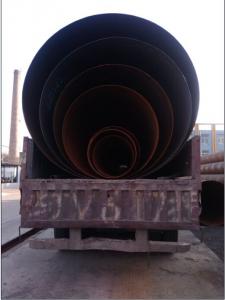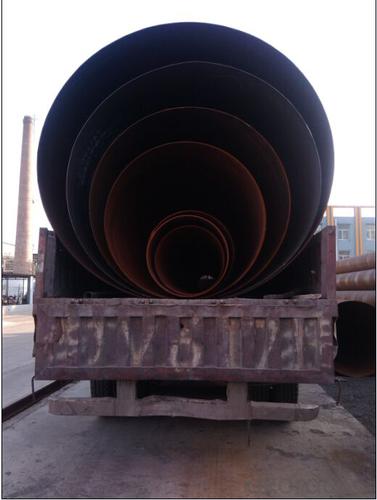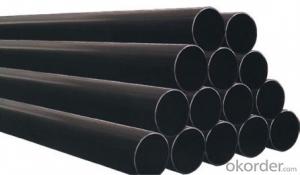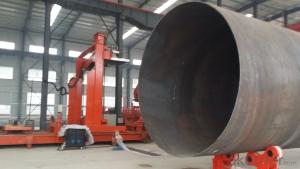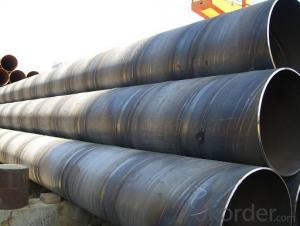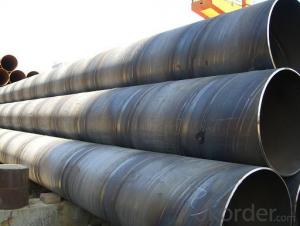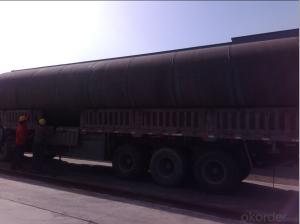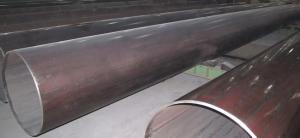56'' CARBON STEEL SSAW WELDED PIPE API/ASTM/JIS/DIN
- Loading Port:
- Tianjin
- Payment Terms:
- TT OR LC
- Min Order Qty:
- 5 m.t
- Supply Capability:
- 300 m.t/month
OKorder Service Pledge
OKorder Financial Service
You Might Also Like
Packaging & Delivery
Packaging Detail: | standard export packing or as customer's requirement |
Delivery Detail: | within 10 - 30 days |
Specifications
Spiral Welded Steel Pipes and Tubes
1.Material:Q195-Q235
2.Length:1-12m
3.WT:1.0-14mm
4.O.D.:20-273mm
Product Description:
1.Material : Q235,Q345,L245,L290,L360,L415,L450,L485,GrB,X42,46,X52,X56,X60,X65,X70,X80,X100
2,Standard: SY/T5037-2000,GB/T9711-2011,API Spec 5L PSL1/PSL2,ASTM A252\A53,ISO3183,DIN17172,EN10217,JIS G3457,AWWA C200,ASTM A139,ASTM A671,ASTM A672
3.Wall thickness: 3.0mm-30mm
4.Outer diameter: φ168mm-3020mm
5,Length: 5m-12m or as your requirement
6,Corrosion protection standard: DIN30670,DIN30671, AWWAC210, AWWA C203, SY/T0413-2002,SY/T0414-2002
7,Application: Oil, gas, natural gas, water pipe, thermal electricity pipe, steel structure engineering, etc
Q195-q345 Material Steel Pipe's Materials
Elements | Chemical Compsition% | Mechanical Property | ||||||
C% | Mn% | S% | P% | Si% | Yield Point (Mpa) | Tensile Strength(Mpa) | Elongation | |
Q195 | 0.06-0.12 | 0.25-0.50 | <0.050< span=""> | <0.045< span=""> | <0.030< span=""> | >195 | 315-430 | 32-33 |
Q215 | 0.09-0.15 | 0.25-0.55 | <0.05< span=""> | <0.045< span=""> | <0.030< span=""> | >215 | 335-450 | 26-31 |
Q235 | 0.12-0.20 | 0.30-0.70 | <0.045< span=""> | <0.045< span=""> | <0.030< span=""> | >235 | 375-500 | 24-26 |
Q345 | <0.20< span=""> | 1.0-1.6 | <0.040< span=""> | <0.040< span=""> | <0.55< span=""> | >345 | 470-630 | 21-22 |
Packaging & Delivery
Packaging Detail: | Normal exporting packing,in container or bulk vessel or as per clients' request |
Delivery Detail: | 2 months after confimed contract |
Specifications
Large Diameter API 5L X70 PSL2 LSAW Steel Pipe
Grade: X42, X46, X50, X52, X60, B, C
OD: 1.5"-28"
WT: SCH10-SCH160
Brand:TPCO
Large Diameter API 5L X70 PSL2 LSAW Steel Pipe
Specifications:
u Standard: API 5L
u Grade: B, C, X42, X46, X50, X52, X56, X60, X65, X70, X80
u OD: 1.5"-28"
u WT: SCH10-SCH160
u Length: 5-12m
u Ends Finish: plain end, bevel end, grooved end
u Surface Treatment: bare, black varnished, oiled finish, red color, anti-corrosion, 3PE, FBE or epoxy coating
u Technique: hot rolled or cold drawn
u Application: api 5l steel pipe for conveying oil, water, gas
u Invoicing: based on theoretical weight or actual weight
u Payment Terms: L/C at sight, T/T or Western Union
u Trade Terms: FOB, CFR, CIF
u Certification: ABS manufacturing assessment, ABS design assessment, API 5CT, API 5L, DNV manufacturer certificate, ISO9001 quality management system certificate, ISO14001 environment management system certificate, GB/T28001 occupational health and safety management system certificate, A1 class manufacturing license of special equipment certificate, CCS, GL, LR, SGS, TüV, PDE
- Q: What are the common uses of stainless steel pipes?
- Various industries widely use stainless steel pipes for numerous purposes. Some common applications of these pipes include: 1. Plumbing and Water Supply: Stainless steel pipes are popularly utilized in residential, commercial, and industrial plumbing systems due to their resistance against corrosion, durability, and capacity to handle high-pressure situations. They are also employed in water treatment plants and wastewater management systems. 2. Oil and Gas Industry: The oil and gas industry extensively relies on stainless steel pipes for the transportation of oil, gas, and other fluids. These pipes can endure high temperatures, pressure, and corrosive environments, making them ideal for this sector. 3. Food and Beverage Industry: The food and beverage industry frequently employs stainless steel pipes because of their hygienic properties and ability to resist corrosion. These pipes are commonly used for the transportation of liquids, gases, and food products in processing plants, breweries, wineries, dairies, and other food-related facilities. 4. Chemical and Petrochemical Industry: Stainless steel pipes play a critical role in the chemical and petrochemical industry, where they are utilized for transporting corrosive chemicals, acids, and other hazardous substances. The pipes' resistance to corrosion and high temperatures makes them suitable for these demanding applications. 5. Construction and Architecture: Stainless steel pipes are utilized in construction and architecture for various purposes such as providing structural support, creating handrails, guardrails, and decorative elements. Their strength, durability, and aesthetic appeal make them a popular choice in contemporary architectural designs. 6. Automotive and Transportation: The automotive industry relies on stainless steel pipes for exhaust systems, fuel lines, and other components that require resistance to high temperatures and corrosion. These pipes are also used in the transportation of fluids and gases in ships, trains, and airplanes. 7. Pharmaceutical Industry: The pharmaceutical industry necessitates high-quality materials that adhere to stringent sanitary standards. Stainless steel pipes are commonly used in pharmaceutical manufacturing processes for transporting liquids, gases, and chemicals due to their cleanability, resistance to corrosion, and compatibility with pharmaceutical products. 8. Power Generation: Stainless steel pipes find applications in power plants, both conventional and renewable, for various purposes such as steam lines, condensers, and heat exchangers. These pipes are selected for their ability to withstand high temperatures, pressure, and corrosive environments. In conclusion, stainless steel pipes have a wide range of applications in various industries, including plumbing, oil and gas, food and beverage, chemical and petrochemical, construction, automotive, pharmaceutical, and power generation. Their resistance to corrosion, durability, and ability to handle high temperatures and pressure make them a versatile and reliable choice for numerous industrial applications.
- Q: How much is 4 inches steel tube MM?
- The nominal diameter of the 4 inch steel pipe is DN100, that is to say, the diameter of the center of the pipe wall is 100mm.
- Q: How are steel pipes used in the construction of shipbuilding?
- Steel pipes are used in shipbuilding for a variety of purposes, including the construction of the ship's framework, hull, and various onboard systems. These pipes provide structural strength and durability, allowing the ship to withstand the harsh conditions at sea. They are also used for piping systems, such as fuel, water, and ventilation, ensuring the efficient operation of the vessel.
- Q: What is the shear strength of steel pipes?
- The shear strength of steel pipes can vary depending on various factors such as the grade and thickness of the steel, as well as the manufacturing process and any additional treatments or coatings applied. In general, steel pipes have a high shear strength due to the inherent strength of steel as a material. The shear strength is typically determined through testing and can range from 50,000 to 80,000 pounds per square inch (PSI) for common grades of steel pipes. However, it is important to note that the shear strength can be significantly higher for specialized or higher-grade steel pipes designed for specific applications such as offshore drilling or high-pressure systems. Therefore, it is advisable to consult the manufacturer's specifications or engineering standards for accurate and specific shear strength values for a particular steel pipe.
- Q: What's the material of Q325 steel pipe?
- Q235 refers to the material yield stress of 235MPa carbon steel, because of its low price, good machining and welding performance, it is generally used for welding structural parts. Of course, the unimportant parts can be used for it.
- Q: What are the different types of joints used with steel pipes?
- There are several types of joints used with steel pipes, including threaded joints, welded joints, flanged joints, and grooved joints.
- Q: How are steel pipes used in the power generation sector?
- Steel pipes are commonly used in the power generation sector for various applications such as transporting water, steam, and other fluids within power plants. They are used for conveying high-pressure steam to drive turbines and generate electricity, as well as for transporting cooling water to regulate temperature in power plants. Additionally, steel pipes are used in the construction of power plant infrastructure, including the fabrication of boiler tubes, condenser tubes, and other critical components that ensure efficient and reliable power generation.
- Q: Can steel pipes be used for oil refinery applications?
- Yes, steel pipes can be used for oil refinery applications. Steel pipes offer many advantages for oil refinery applications including high strength, durability, and resistance to corrosion. They are able to withstand high pressure and temperature conditions that are common in oil refinery operations. Steel pipes are also easy to transport and install, making them a popular choice for oil refinery projects. Additionally, steel pipes can be customized to meet specific requirements such as size, thickness, and coating, making them suitable for a wide range of oil refinery applications.
- Q: What is the difference between black steel pipe and galvanized steel pipe?
- The main difference between black steel pipe and galvanized steel pipe lies in their coating. Black steel pipe is untreated and has a dark, matte appearance, while galvanized steel pipe is coated with a layer of zinc to prevent rusting and has a silver, shiny appearance. This coating makes galvanized steel pipes more durable and suitable for outdoor use, while black steel pipes are commonly used for indoor plumbing and gas lines.
- Q: What are the different types of steel pipe coatings for chemical processing plants?
- There are several types of steel pipe coatings commonly used in chemical processing plants, including epoxy coatings, polyethylene coatings, and fusion-bonded epoxy coatings. These coatings provide protection against corrosion and chemical damage, ensuring the longevity and safety of the pipes in such environments.
Send your message to us
56'' CARBON STEEL SSAW WELDED PIPE API/ASTM/JIS/DIN
- Loading Port:
- Tianjin
- Payment Terms:
- TT OR LC
- Min Order Qty:
- 5 m.t
- Supply Capability:
- 300 m.t/month
OKorder Service Pledge
OKorder Financial Service
Similar products
Hot products
Hot Searches
Related keywords
